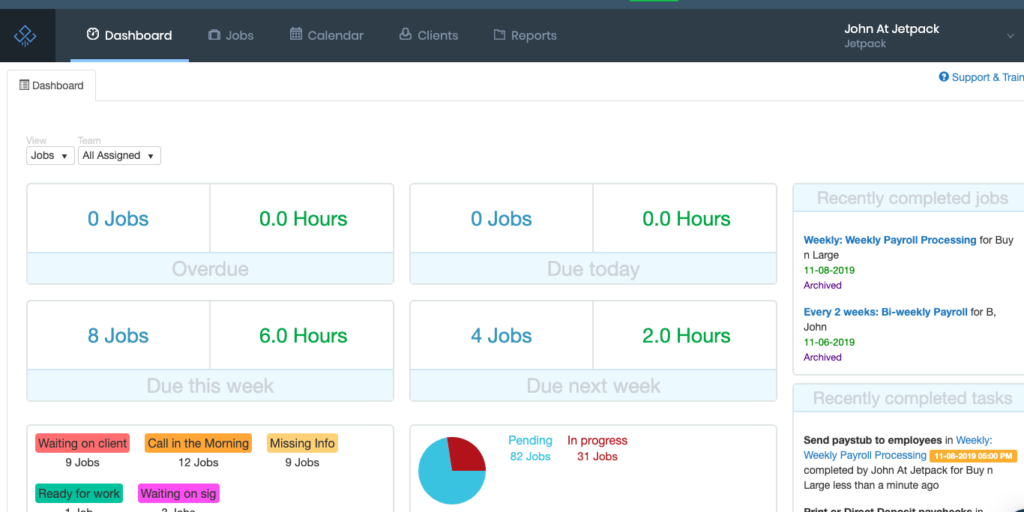So you got a new client or a new job, set a deadline and a few weeks later, you’re wondering — “HOW did I miss this deadline?”, and “Wow, this is due tomorrow?” Cue the stress and the immediate search for a good due date tracker.
Due date tracking software can mean the difference between a great first impression for new clients and keeping a client year after year. First impressions mean a lot in a business where relationships are the key to a successful partnership. When a business keeps missing deadlines, it can set you up for some tough talks, and when you’re trying to build and scale, it’s the last thing you want to worry about.
For new clients in your firm, a missed deadline is a missed opportunity to impress them out the gate and solidify their choice in your business. For long time clients, you may have some leeway, but there will always be a turning point: one too many missed deadlines and they are likely going to go searching for another practice and your reputation will begin to suffer.
With that in mind, here are a few tips to help track due dates and manage both client and team expectations for delivery of your services.
Set Expectations for Deadlines Ahead of Time
Setting reasonable deadline expectations is not always as easy as it first seems. Just because you have a due date on an item, doesn’t mean your job is done. Often, you will be dealing with multiple deadlines within a project, as well as multiple layers of approval.
When setting due dates, keep in mind:
- the actual deadline when the items need to get out the door
- the internal deadline for any approvals from team members
- and the deadlines for yourself and your client to make sure you have all the items you need to complete the job correctly.
- Employee capacity and the number of other deadlines that they may be carrying in the same timeframe
Often you find yourself working backwards. Start with the LAST deadline you need and work back to the present time to understand what steps you need to accomplish to get there.
Now is probably the best time to onboard due date tracking sofware so you never let work fall through the cracks. Typically these tools have workload management software built in so you know exactly what your team is working on and who has capacity.
Communicate Every Step of the Way
Build into your company the culture of client communication. Clients get the most antsy when they don’t know what is going on. Mitigate their worry or their questions ahead of time by sending them updates when significant milestones are accomplished.
Also, don’t be afraid to communicate ahead of time if you think you need to push a deadline back. In fact, if you know that is going to happen, and there is some flexibility on the issue, communicate that. Clients are going to be much more receptive and understanding if they know a few weeks in advance, or even few days in advance if a deadline can’t be met. This is much better than telling them on the day of that you won’t meet a deadline!
This is such an easy step but gets overlooked pretty often, leading to clients who are confused, team members who are unsure where things stand, and sometimes a mad last scramble to get things done.
As much as you might be communicating with your client, make sure your team also knows that they should be communicating needs to you as well. If there are deadlines they are nervous that they can’t hit, if they are not getting responses they need in a timely manner from the client, your work environment should be open and communicative so they can bring those concerns to you or other members of a leadership team. Effective team management starts with communication, especially since many firms are hiring remote workers.
As you grow, make sure communication is a part of the training that all employees receive as this is something that is too often overlooked until it becomes a problem!
Follow Through
This is probably one of the most important things for tracking due dates. If you set a deadline, if you communicate a next step…follow through with your word. In the world of accounting and bookkeeping, deadlines and specifically tax deadlines, are what defines your business (and there is tax tracking software designed specifically for this!)
If you continually miss deadlines, you’ll start to find yourself in the ever-increasing panic spiral of catching up, missing more deadlines, unhappy clients, and unhappy employees. You’ll be forever stuck in the whack-a-mole game and you won’t experience the firm growth you are looking to achieve.
Find the Due Date Tracking Software for Your Firm
As important as the mental and planning exercises are for proper due time tracking and task management, you still absolutely need the right tools to get the job done. Jetpack Workflow is the leading cloud based application that helps accounting professionals regain control over their firm, get transparency over their client work, and helps them focus on high value, billable hours.
Inside of Jetpack Workflow, you can instantly track deadlines and due dates to make sure nothing falls through the cracks. Think of us as a project deadline tracker built for professionals with recurring deadlines.
Using our advanced search bar, you can quickly bring all instances of a certain type of work (a specific return, for example). In addition to the custom filters and advanced search, we also have email notifications for when client work becomes overdue, or rolls over to a due date extension.
While simple in theory, tracking due dates for hundreds or thousands of clients and each of their respective projects is no small feat. Find a due date tracking software that will do the hard work for you so you can focus on the work that needs to be done.


